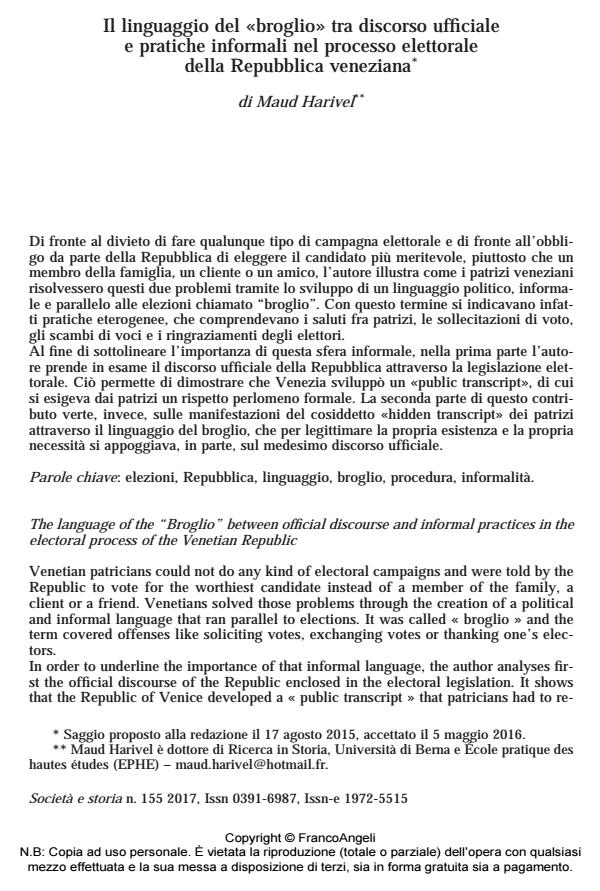Il linguaggio del «broglio» tra discorso ufficiale e pratiche informali nel processo elettorale della Repubblica veneziana
Titolo Rivista SOCIETÀ E STORIA
Autori/Curatori Maud Harivel
Anno di pubblicazione 2017 Fascicolo 2017/155
Lingua Italiano Numero pagine 27 P. 33-59 Dimensione file 93 KB
DOI 10.3280/SS2017-155003
Il DOI è il codice a barre della proprietà intellettuale: per saperne di più
clicca qui
Qui sotto puoi vedere in anteprima la prima pagina di questo articolo.
Se questo articolo ti interessa, lo puoi acquistare (e scaricare in formato pdf) seguendo le facili indicazioni per acquistare il download credit. Acquista Download Credits per scaricare questo Articolo in formato PDF

FrancoAngeli è membro della Publishers International Linking Association, Inc (PILA), associazione indipendente e non profit per facilitare (attraverso i servizi tecnologici implementati da CrossRef.org) l’accesso degli studiosi ai contenuti digitali nelle pubblicazioni professionali e scientifiche.
Di fronte al divieto di fare qualunque tipo di campagna elettorale e di fronte all’obbligo da parte della Repubblica di eleggere il candidato più meritevole, piuttosto che un membro della famiglia, un cliente o un amico, l’autore illustra come i patrizi veneziani risolvessero questi due problemi tramite lo sviluppo di un linguaggio politico, informale e parallelo alle elezioni chiamato "broglio". Con questo termine si indicavano infatti pratiche eterogenee, che comprendevano i saluti fra patrizi, le sollecitazioni di voto, gli scambi di voci e i ringraziamenti degli elettori. Al fine di sottolineare l’importanza di questa sfera informale, nella prima parte l’autore prende in esame il discorso ufficiale della Repubblica attraverso la legislazione elettorale. Ciò permette di dimostrare che Venezia sviluppò un «public transcript», di cui si esigeva dai patrizi un rispetto perlomeno formale. La seconda parte di questo contributo verte, invece, sulle manifestazioni del cosiddetto «hidden transcript» dei patrizi attraverso il linguaggio del broglio, che per legittimare la propria esistenza e la propria necessità si appoggiava, in parte, sul medesimo discorso ufficiale.
Parole chiave:Elezioni, Repubblica, linguaggio, broglio, procedura, informalità.
- Quale storia della società? Uno sguardo sull'epoca moderna Paola Bianchi, in SOCIETÀ E STORIA 178/2023 pp.711
DOI: 10.3280/SS2022-178005
Maud Harivel, Il linguaggio del «broglio» tra discorso ufficiale e pratiche informali nel processo elettorale della Repubblica veneziana in "SOCIETÀ E STORIA " 155/2017, pp 33-59, DOI: 10.3280/SS2017-155003